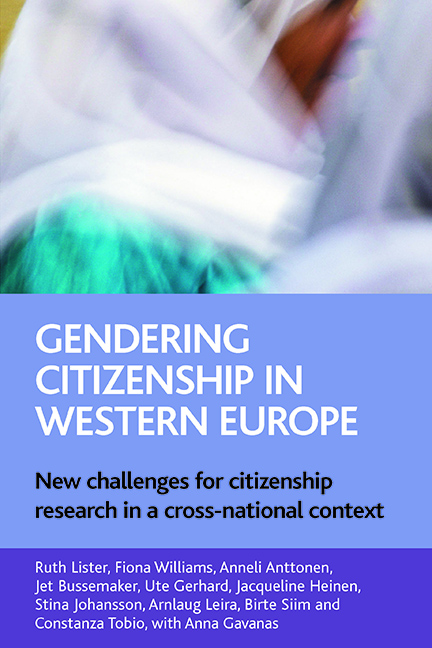 Gendering Citizenship in Western Europe
Gendering Citizenship in Western Europe Published online by Cambridge University Press: 15 September 2022
Introduction
Globalisation, European integration and migration pose new challenges for understanding citizenship from a transnational perspective. Since the 1990s the increase in migrants and refugees has sparked new political debates about multiculturalism and multicultural policies across Europe, debates which have, increasingly after 9/11, been coloured by Islamophobia. These debates follow both similar and diverging paths in different European countries, all of which carry different legacies of colonialism, imperialism, and different histories of migration. In some, the debates about multiculturalism are new; in others, such as the UK, they revive and reshape debates of the 1960s following post-war immigration. Along with these differences, the heterogeneity of groups and the policies and lived experiences also constitute aspects of recent and past migration. With increasing immigration restrictions in Europe, the only way to gain legal access to enter many countries has been through family unification or as refugees or, to a lesser extent, as workers with designated and required skills. Since the early 1980s female labour migration has increased along with a growing stratification between different migrant groups, according to qualifications and skills (Kofman et al, 2005).
The overall objective of this chapter is to explore the meaning of these challenges of migration and multiculturalism for gendered citizenship. The focus is on the intersection of gender with (minority) ethnicity, in terms of the rights and claims of minority ethnic women, in those nine European countries which are the subject of this book, taking into account their differing citizenship, migration and gender regimes. Multiculturalism is an ambiguous term that refers to principles that either respect minority rights or defend special rights for minority groups. The debates point to how public policies deal with difference and diversity, as well as normative visions about diversity, and strategies for achieving these visions. Multiculturalism is also highly complex because, as Chapter Five shows, policies and public discourses often differ from the lived practices of citizens.
Migration and multiculturalism represent a double challenge for the classic framing of citizenship in that they force us to analyse the tension between equality and recognition of diversity and the relationship between national and transnational arenas. Citizenship is about the inclusion and exclusion of individuals and social groups in societies where struggles over rights have been closely linked to the nation state.
To save this book to your Kindle, first ensure no-reply@cambridge.org is added to your Approved Personal Document E-mail List under your Personal Document Settings on the Manage Your Content and Devices page of your Amazon account. Then enter the ‘name’ part of your Kindle email address below. Find out more about saving to your Kindle.
Note you can select to save to either the @free.kindle.com or @kindle.com variations. ‘@free.kindle.com’ emails are free but can only be saved to your device when it is connected to wi-fi. ‘@kindle.com’ emails can be delivered even when you are not connected to wi-fi, but note that service fees apply.
Find out more about the Kindle Personal Document Service.
To save content items to your account, please confirm that you agree to abide by our usage policies. If this is the first time you use this feature, you will be asked to authorise Cambridge Core to connect with your account. Find out more about saving content to Dropbox.
To save content items to your account, please confirm that you agree to abide by our usage policies. If this is the first time you use this feature, you will be asked to authorise Cambridge Core to connect with your account. Find out more about saving content to Google Drive.